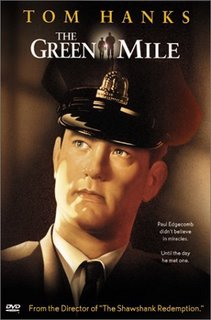 #5 The
#5 The This Film gets on the list for it’s take on an alternate prison. The prison in The Last Castle is a military penal institution. The protagonist, Lt. Gen. Eugene Irwin (Robert Redford), is a legendary war general, most famous for his time spent in a P.O.W camp and his book on modern war tactics, who is stripped of his life earned rank for his stint in prison. The antagonist, Col. Winter (James Gandolfini), is a R.E.M.F (I probably shouldn’t expound on this acronym) officer school graduate who has an affinity for war theory and history and runs the prison. Of a collection of war artifacts in his office Lt. Gen. Irwin has this to say. “Any man with a collection like this is a man who's never set foot on a battlefield. To him a miniball from
We come to find out that Col. Winter is a shoddy warden at best; at worst diabolical. He orders a man to be killed at one point. The story develops to be about the conflict between two leaders, one with unlimited resources, and one who relies solely on the will of his men. The men in the prison are stripped of rank, but Irwin gives them back that respect and rallies them against the unfairness of the warden.
The Hurricane is the true story of Rubin “Hurricane” Carter (Denzel Washington), a pugilist wrongfully imprisoned for murder, and the folks that help him to be freed. Rubin Carters story is one of those like so many others in the throws of the racially charged revolutions of the sixties. He wrote a book while he spent half his life in prison, and Bob Dylan even wrote a song about him. It’s a moving story, but its utter reliance on the emotional performance of Denzel keeps it low on the list.
This film almost made my theology movie list. It’s the story of a death row block called the green mile. An extremely large, mildly retarded and wrongfully accused black man named John Coffey (Michael Clarke Duncan) comes to live on the mile. We find out that he has an ability to take away the damage of injury and sickness. The film almost made my theology list because I see a bit of a parallel between John Coffey and Jesus Christ. It’s happenstance though that they have the same initials. Stephen King says he picked the name based on a professor he met once.
King released this story in six or seven volumes; I waited for the compilation. When I read I was hoping to read a good little story. What I got was a feeling of defeat. No good deed goes unpunished. I felt like Paul Edgecomb (Tom Hanks) when he said, “On the day of my judgment, when I stand before God, and He asks me why did I kill one of his true miracles, what am I gonna say? That is was my job? My job?”
Escape From Alcatraz is one of Eastwood’s best. It tells the story of a prisoner with a superior intellect, who figures out a way to escape the inescapable prison. The cool thing about this story is that it may have actually happened. It is the retelling of one of the documented escape attempt stories. No bodies were ever found in conjunction with the investigation. Recently the Myth Busters proved that the way the prisoners are said to have escaped is possible.
This film is well directed and well acted, so it earns its place at number 4.
What most people don’t know it that this film is based on a short story by Stephen King called “Rita Haworth and the Shawshank Redemption.” You may remember the poster of Rita that Andy Dufresne (Tim Robbins) hung on his wall to hide an escape whole. I like that this movie exposes the basic penal institution’s main problem. Red (Morgan Freeman) says it best in narration, “These walls are kind of funny. First you hate 'em, then you get used to 'em. Enough time passes, gets so you depend on them. That's institutionalized. They send you here for life, that's exactly what they take. The part that counts, anyways.”
Speaking of Red’s narration, it makes the film. Eloquently written and poignant of the reality of life in Shawshank. The film also offers, in motif, the antidote to institutionalization. Red narrates, “I find I'm so excited, I can barely sit still or hold a thought in my head. I think it's the excitement only a free man can feel, a free man at the start of a long journey whose conclusion is uncertain. I hope I can make it across the border. I hope to see my friend, and shake his hand. I hope the Pacific is as blue as it has been in my dreams. I hope.” Hope, in a word. Andy says it’s the only thing they can’t take from you unless you let them.
To close I’ll share my favorite scene from possibly my favorite movie. At his parole hearing Red has this conversation with the guy in charge.
Red: Rehabilitated? Well, Now let me see. You know, I don't have any idea what that means.
Parole official: Well, it means that you're ready to rejoin society.
Red: I know what you think it means, sonny. To me it's just a made up word; a politician's word. So young fellas like yourself can wear a suit, and tie, and have a job. What do you really want to know? Am I sorry for what I did?
Parole official: Well, are you?
Red: There's not a day goes by I don't feel regret. Not because I'm in here, or because you think I should. I look back on the way I was then, a young, stupid kid who committed that terrible crime. I want to talk to him. I want to try and talk some sense to him, tell him the way things are. But I can't. That kid's long gone and this old man is all that's left. I got to live with that. Rehabilitated? It's just a bullshit word. So you go on and stamp your form, sonny, and stop wasting my time. Because to tell you the truth, I don't give a shit.












